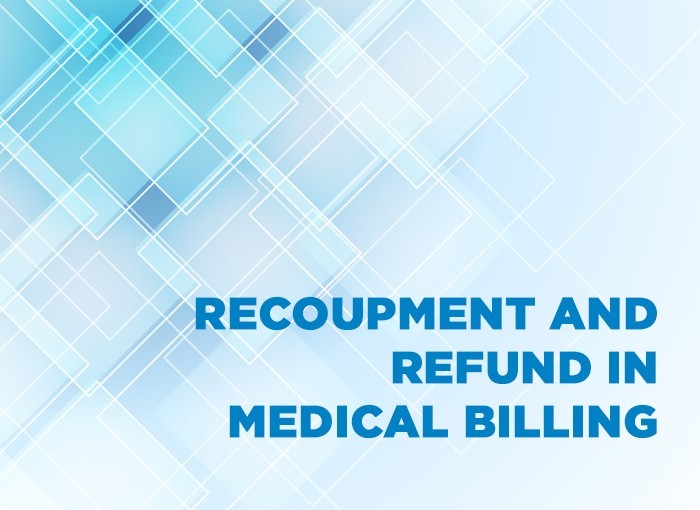Comprehending the financial mechanisms and language of medical billing is important for healthcare providers and billing practitioners alike. Why? Amongst the most frequently misused terms in the field are “refund” and “recoupment.” Both processes relate to returning or adjusting payments. That the two processes differ in meaning and implications. These distinctions are especially important in preventing possible revenue loss in a healthcare organization.
This blog will examine the differences between refunds and recoupments in medical billing. How they affect healthcare providers, and how medical billing services handle them.
What Is Recoupment in Medical Billing?
A payer (usually an insurance provider) recovers payments already made to a healthcare provider by realizing an excess payment. This usually happens because of a mistake, miscalculation, or problem with a claim submitted.
As a form of recoupment, the creditor modifies the amount owed for a future claim to “recoup” the excess already. The payor, mostly an insurer, actively returns payments made to a healthcare provider through recoupment. It occurs when the payor believes that too much money has been paid. For example, in case of an error, overpayment, or issue related to a filed claim.
In the context of recoupment, the lender truncates the sum payable on the subsequent claim to reimburse himself for the advance overpayment. Instead of requesting that the provider return the overpayment. The payer recoups the overpayment by withholding subsequent payments until they have been completely repaid.
Characteristics of Recoupment:
- Payer-Initiated: The insurance payer is responsible for instigating a recoupment exercise where an overpayment has been made and action is sought.
- Reduction in Gran E: Rather than requiring an upfront repayment, which could adversely affect cash flow, especially for the provider, the payer lessens compensation on additional claims made by the provider.
- Reclamation Process: Recoupment usually follows the ‘death’ of a claim after a review, audit, or appeal, where there is a mistake that the insurance company pays for—such as a bill sent twice, incorrect codes, or even a problem with the patient’s coverage.
- Impacts on Cash Flow: Recoupment, especially to the health care providers, has a cash flow concern as it cushions the effect of overpayment by reducing excessive future payments without notice, complicating forecasts and revenue management.
What Is a Refund in Medical Billing?
In contrast, a refund is when a healthcare provider gives money back to a payer. This is usually due to excess money paid or a mistake in billing. Once the provider identifies an overpayment or receives a demand for funds from the payer, they issue refunds. The provider refunds the payment to a third party. Unlike refunds, the offering party has to return the excess payment in physical cash, and recoupment affects future payments. Refunds can also occur when a patient pays too much due to billing mistakes. Due to unclear communications over how much co-pay, deductible, or coinsurance to pay.
Key Features of a Refund:
- Provider-Initiated: Refunds are most often paid back or adjusted by the healthcare provider if a payor overpays or after he or she has been instructed to correct the billing by the payor.
- Immediate Payment Return: In case of a refund, the provider reimburses a patient or payer directly for the amount overpaid. This is a different transaction from payments for future claims.
- Corrective Action: Refunds are generally issued following the provider’s reconciliation of their accounts receivable or following an appeal by the payer who identifies a problem and requests that funds be returned.
- Less Impact on Future Cash Flow: Refunds constitute complete payments, which differ from recoupments. Hence, they have no effect on future claims or payments. Nevertheless, refunds may still influence a provider’s current cash balance.
The Differences Between Recoupment and Refund in Medical Billing
While both recoupment and refunds involve the return of money, there are several distinct differences between the two processes:
| Aspect | Refund | Recoupment |
| Initiation | Initiated by the provider or payer | Initiated by the payer |
| Payment Method | Direct return of overpayment by the provider | Deducted from future payments |
| Impact on Cash Flow | One-time financial transactions | Reduce future reimbursements |
| Timeline | Immediate return of funds | Recovery occurs gradually over time |
| Reconciliation | is Typically the result of a provider audit or prayer request | Typically, the result of payer audits or claims review |
Common Reasons for Refunds:
- Overpayments For Claims: Once a claim payment is made, it should not be made again. However, certain situations may necessitate a refund of the extra payment to the payer.
- Overbilling: refers to refunding a provider’s payment because more than one incorrect bill was submitted for the same patient or procedure.
- Overpayment Received from Patients: In other cases, patients pay more than the requisite amount for the services rendered to them through no fault, for instance, knowing how many coinsurance, deductibles, or benefits they have. The payer is seeking a refund.
- Adjustments Made By Insurers: An insurer pays less than what was billed for the services because the claimed amount is adjusted due to coverage restrictions or policy updates. The provider may need a refund.
Common Reasons for Recoupments:
- Payer Overpayments: If the payer detects an overpayment during an audit, a recoupment will be commenced to recover the payment made in excess.
- Coverage Problems: When the payer realizes that the patient was not eligible for coverage during service provision, he may seek to recover the payments made.
- Medical Necessity Rejections: If a particular service is later found not appropriate medically, the payer has the right to continue with the recoupment.
- Reimbursement Post Audit: Insurance corporations frequently audit claims that have already been filled and may find discrepancies, resulting in a recoupment.
The Role of Medical Billing Services in Managing Refunds and Recoupments
The procedures involved in refunds and recoupments can be difficult and prone to mismanagement, resulting in revenue loss. It is during these circumstances that professional medical billing services come in handy. They are professionals in handling such cases and help ensure that the providers do not run out of cash. They also help avoid legal and financial consequences.
This is how the billing services are useful to the health care system in recoupment and refund management scenarios:
Auditing and Error Detection
Medical billing services ensure thorough audits of billing claims at regular intervals. It aims to eliminate any errors that may result in an overpayment or recouping of claims. The measures taken in this case minimize the chances of them happening.
Timely Refund Management
A medical billing specialist can expedite the refund process and prevent delays in returning overpayments. This ensures that providers comply with the payer’s laws and avoid sanctions.
Monitoring Payer Activities
Medical billing services manage the insurer’s activities, including conducting audits or taking recoupment actions on behalf of the firm or corporation. This allows providers to stay informed and promptly address any recoupment actions effectively.
Appeal Denied Claims
In some situations, medical billing services help appeal denied claims, removing the need for in-house recoveries. They will help provide the evidence and reasons to avoid the damages caused by Recovery.
Protecting Provider Revenue
Such services ensure that claims are error-free and providers’ revenue is secure by preventing overpayments. They also assist providers in resolving issues with payers by addressing overpayments or payment reductions. It helps them maintain a positive cash flow.
Conclusion
For healthcare providers and billing associates alike, it’s important to grasp the notion of refunds and recoupments within medical billing. Both processes involve returning money. The provider initiates the refund process, which involves recovering cash. Income recoupments take a top-down approach regarding future payments to the payers.
Effective control of these processes is also very important within the revenue cycle system. Medical billing services enable healthcare providers to bill correctly, reduce the chances of overpayment, and ensure they do not harm their finances due to refunds or recoupments.
The healthcare institution can concentrate on important patient care activities by outsourcing billing and revenue management services to qualified personnel. This ensures that the practice retains compliance with payers and protects its finances.






